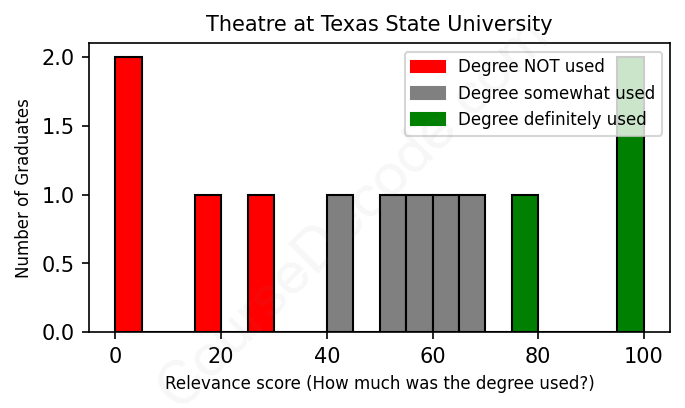
First, some facts. Of the Theatre graduates from Texas State University we've analyzed , here's how many have used (or NOT used) their degree in their career:

These are estimates based on AI analysis of 12 LinkedIn profiles (see below).
The verdict? Significantly below average. Overall, with an average relevance score of 50%, Theatre graduates from Texas State University have a much lower likelihood (-17%) of finding work in this field compared to the average graduate across all fields:
And for comparison, here's the chart for all profiles we've looked at across all degrees.
Also, after graduating, only 0% of these graduates have pursued further education other than another Bachelor's degree (such as a Masters degree or other), compared to the average across all profiles of 35%. This suggests a Bachelors degree is enough for most Theatre graduates, and it's normal to look for work straight after graduation.
See the details:
|
Relevance score: 76% We think this person has gone into a career highly relevant to their degree. We think this person has gone into a career highly relevant to their degree.
DEGREE INFOGraduated in 2021 from Texas State University with a Bachelor of Fine Arts - BFA in Theatre. No other secondary education since. JOB HISTORY SINCE GRADUATIONCasting Intern Vicky Boone Casting Jan 2021 - May 2021 Extras Casting Assistant  Brock Allen Casting Aug 2021 - Sep 2022 Casting Assistant  Clark + Geier Casting Oct 2022 - Mar 2023 Brand Representative  Altar'd State Mar 2023 - Apr 2023 Manager  Coach Apr 2023 - Jan 2024 Casting Assistant  Clark + Geier Casting Dec 2023 - Present ABOUTNo information provided. |
The top 10 most common jobs done by the graduates we've analyzed (ranked most common to least) are:
Here is a visual representation of the most common words in job titles for Theatre graduates (this is across all Theatre graduates we've analyzed, not just those who went to Texas State University):

Based on the LinkedIn profiles you’ve gathered, it seems that graduates from the Theatre program at Texas State University have taken a diverse range of career paths, with many veering away from traditional theatre roles. Right after graduation, many seem to land their first jobs in areas that aren't directly related to theatre performance or production. For instance, roles like customer service analysts, office assistants, or even hospitality positions pop up frequently. This suggests that many graduates are likely taking jobs in more practical fields that may provide financial stability while they figure out their long-term aspirations.
As time goes on, though, some graduates do eventually find their way back to theatre and related industries. A few have established more direct ties to the performing arts, like directing high school theater or working as stage managers and event coordinators. However, it's apparent that not everyone sticks with a path tied to their degree, as several alumni transition into roles in business, management, or even education. After five to ten years, many seem to find a mix of positions—some related to theatre, while others belong to entirely different sectors. Overall, while there are success stories within the arts, a significant number of graduates appear to be taking advantage of their skills in various fields, which might leave some feeling a bit far from their roots in theatre.
Honestly, a Bachelor’s degree in Theatre can be pretty challenging, but it really depends on your passion and dedication to the craft. At Texas State University, known for its solid program, you'll likely dive into a mix of practical performance, technical skills, and theory, which keeps things interesting but can also be demanding. You'll have to juggle rehearsals, performances, and classes, which can be a lot to handle. If you're someone who thrives on creativity and collaboration, it can be a rewarding experience, but expect to put in some serious effort. It's definitely not a walk in the park, but if you love theatre, it can be a really fulfilling journey!
Most commonly, in the LinkedIn profiles we've looked at, it takes people 4 years to finish a Bachelor degree in Theatre.
Alright, so looking at these Texas State University Theater grads, it seems like they're navigating a pretty varied path after school. Some of them, like the ones working as legal assistants or in executive roles at IMAX or Oak Hill Advisors, are likely making decent money, considering those positions usually pay well. On the other hand, you've got folks in production and service roles, like baristas or event managers, and while those can be fun and engaging jobs, they often come with lower pay. In general, it looks like a mixed bag; some are definitely climbing the income ladder, while others are probably just scraping by, especially in those earlier jobs. So, it's like a big theatrical performance of financial ups and downs!
Here is a visual representation of the most common words seen in the "about" section of LinkedIn profiles who have a Bachelor degree in Theatre (this is across all Theatre graduates we've analyzed, not just those who went to Texas State University). This may or may not be useful:

Here are all colleges offering a Bachelor degree in Theatre (ordered by the average relevance score of their Theatre graduates, best to worst) where we have analyzed at least 10 of their graduates:
| College | Score | Count |
|---|---|---|
 Northwestern University Northwestern University
|
63 | 13 |
 Texas State University Texas State University
|
50 | 12 |
 University of Southern California University of Southern California
|
49 | 10 |
 Columbia College Chicago Columbia College Chicago
|
42 | 13 |